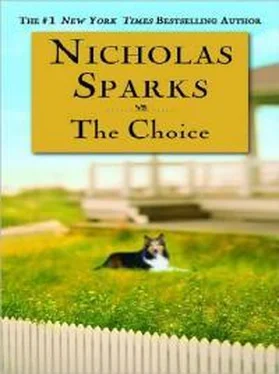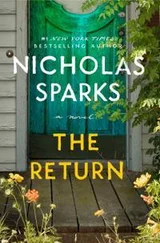Travis turned toward the window. Through the glass, he could see the lights from his neighbors’ houses gleaming in the darkness. “I couldn’t do it,” he finally said.
He tried to collect his thoughts. “I thought I could, and I even rehearsed the words I would say when telling the doctors to remove her feeding tube. I know that’s what Gabby wanted, but . . . in the end I just couldn’t do it. Even if I spend the rest of my life visiting her in the nursing home, it’s still a better life than one I could spend with anyone else. I love her too much to let her go.”
Stephanie gave him a wan smile. “I know,” she said. “I could see it on your face when you walked in the door.”
“Do you think I did the right thing?”
“Yes,” she answered without hesitation.
“For me, or for Gabby?”
“Both.”
He swallowed. “Do you think she’ll wake up?”
Stephanie met his eyes. “Yes, I do. I’ve always believed that. The two of you . . . there’s something uncanny about the way you are with each other. I mean everything—the way you look at each other, the way she relaxes when you put your hand on her back, the way you both seem to know what the other is always thinking . . . it’s always struck me as extraordinary. That’s another reason I keep putting marriage off. I know I want something like what you two share, and I’m not sure I’ve found it yet. I’m not sure I ever will. And with love like that . . . they say anything’s possible, right? You love Gabby and Gabby loves you, and I just can’t imagine a world where you’re not together. Together the way you’re meant to be.”
Travis let her words sink in.
“So what’s next?” she asked. “You need help burning the living will?”
Despite the tension, he laughed. “Maybe later.”
“And the lawyer? He won’t come back to haunt you, right?”
“I haven’t heard from him in years.”
“See, that’s another sign you did the right thing.”
“I guess.”
“What about nursing homes?”
“She’ll be transferred next week. I just have to make the arrangements.”
“Need help?”
He massaged his temples, feeling unbearably tired. “Yeah,” he said. “I’d like that.”
“Hey—” She gave him a little shake. “You made the right decision. Don’t feel guilty about a single thing. You did the only thing you could do. She wants to live. She wants the chance to get back to you and the girls.”
“I know. But . . .”
He couldn’t finish his sentence. The past was gone and the future had yet to unfold, and he knew he should focus his life on the present . . . yet his day-to-day existence suddenly struck him as endless and unbearable.
“I’m scared,” he finally admitted.
“I know,” she said, pulling him close. “I’m scared, too.”
Epilogue
June 2007
The muted landscape of winter had given way to the lush colors of late spring, and as Travis sat on the back porch, he could hear birds. Dozens, maybe hundreds, were calling and chirping, and every so often a flock of starlings would break from the trees, flying in formations that nearly seemed choreographed.
It was a Saturday afternoon, and Christine and Lisa were still playing on the tire swing that Travis had hung the week before. Because he wanted a long, slow arc for the girls—something different from the regular swing set—he’d cut a few of the low branches before securing the rope as high in the tree as possible. He’d spent an hour that morning pushing the swing and listening to his daughters squeal in delight; by the time he’d finished, the back of his shirt was slick with perspiration. And still the girls wanted more.
“Let Daddy rest for a few minutes,” he’d wheezed. “Daddy’s tired. Why don’t you push each other for a while.”
Their disappointment, etched so clearly on their faces and in the droop of their shoulders, lasted only moments. Soon they were squealing again. Travis watched them swing, his mouth curling into a slight smile. He loved the musical sound of their laughter, and it warmed his heart to see them playing so well together. He hoped they would always remain as close as they were now. He liked to believe that if he and Stephanie were any indication, they would grow even closer in later years. At least that was the hope. Hope, he’d learned, was sometimes all a person had, and in the past four months, he’d learned to embrace it.
Since he’d made his choice, his life had gradually returned to a kind of normalcy. Or at least a semblance thereof. Along with Stephanie, he’d toured half a dozen nursing homes. Prior to those visits, his preconceptions of nursing homes were that they were all dimly lit, filthy places where confused, moaning patients wandered the halls in the middle of the night and were watched over by orderlies who bordered on the psychotic. None of which turned out to be true. At least, not in the places he and Stephanie visited.
Instead, most were bright and airy, run by thoughtful, reflective middle-aged men or women in suits who went to great pains to prove their facilities were more hygienic than most homes and that the staff was courteous, caring, and professional. While Travis spent the tours wondering whether Gabby would be happy in a place like this or whether she’d be the youngest patient in the nursing home, Stephanie asked the hard questions. She asked about background checks for the staff and emergency procedures, she wondered aloud how quickly complaints were resolved, and as she strolled the halls, she made it obvious that she was well aware of every code and regulation that had been mandated by law. She offered hypothetical situations that might come to pass and asked how they’d be handled by the staff and director; she asked how many times Gabby would be turned in the course of a day, so as to prevent bedsores. At times, she struck Travis as being like a prosecutor trying to convict someone of a crime, and though she ruffled the feathers of a few directors, Travis was grateful for her vigilance. In his state of mind, he was barely able to function, but he was dimly aware that she was asking all the right questions.
In the end, Gabby was transferred by ambulance to a nursing home run by a man named Elliot Harris, only a couple of blocks from the hospital. Harris had impressed not only Travis, but Stephanie as well, and Stephanie had filled out most of the paperwork in his office. She’d insinuated—true or not—that she knew people in the state legislature and ensured that Gabby was given a gracious private room that overlooked a courtyard. When Travis visited her, he rolled the bed toward the window and puffed up her pillows. He imagined that she enjoyed the sounds from the courtyard, where friends and families met, along with the sunlight. She’d said that to him once when he’d been flexing her legs. She’d also said that she understood his choice and that she was glad he’d made it. Or, more accurately, he’d imagined that she had.
After placing her in the home and spending most of another week with her while they both got acclimated to her new environment, he’d gone back to work. He took Stephanie’s suggestion and began working until early afternoon four days a week; his father filled in after that. He hadn’t realized how much he’d missed interaction with other people, and when he had lunch with his father, he found he was able to finish nearly all of his meal. Of course, working regularly meant he had to juggle his schedule with Gabby. After seeing the girls off to school, he went to the nursing home and spent an hour there; after work, he spent another hour with Gabby before the girls got home. On Fridays, he was there most of the day, and on weekends, he usually made it in for a few hours. That depended on the girls’ schedules, which was something Gabby would have insisted on. Sometimes on the weekends they wanted to join him, but most times they didn’t want to or didn’t have the time because of soccer games or parties or roller-skating. Somehow, without the choice of whether Gabby would live or die hovering over him, their growing distance didn’t bother Travis as much as it once had. His daughters were doing what they needed to do to heal and move on, just as he was. He’d lived long enough to know that everyone handled grief in different ways, and little by little, they all seemed to accept their new lives. And then, one afternoon nine weeks after she’d been admitted to the nursing home, the pigeon appeared at Gabby’s window.
Читать дальше











![Николас Спаркс - Каждый вдох [litres]](/books/414723/nikolas-sparks-kazhdyj-vdoh-litres-thumb.webp)
